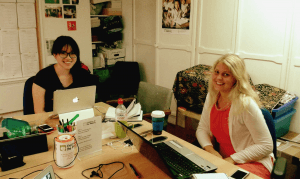
Image from http://powerlisting.wikia.com/wiki/Spiritual_Meditation
Earlier today I was sitting in Gordon Square, one of the most beautiful spots in London in my opinion, watching endless people wandering zombie-like while staring at their mobile phones and completely ignoring the idyllic scene around them while they hunted for Pokemon.
Friends and colleagues have defended Pokemon Go! by saying it’s just a game, and it’s fun, and it’s surely better than slobbing on the sofa playing a computer game in your living room. They also claim it has helped them meet and connect with fellow Londoners, as they bang into them on their way to capture an imaginary critter, which I do appreciate, and blimey does London need more connection between strangers!
However, purely from an outsider’s perspective (as I daren’t download the app) it just looks like all that’s wrong with our society right now and the pinnacle of this rising tide of distraction that has been washing over us since smartphones and 24 hour connectivity entered our lives. We spend every waking hour (definitely including myself in this) eye-locked in to our computer screens, or jumping to check a notification on our phones. Meanwhile, this constant distraction means we’re always in our heads, find it increasingly difficult to concentrate on one thing at a time and are less attuned to what’s actually around us.
But what’s this got to do with careers, I hear you ask!
Well, there’s a recent career theory called Planned Happenstance, which suggests that rather than having a rigid career plan and charging off towards set goals (rather like those Go! players storming around the streets of London to find a rare Pokemon) another more effective approach to careers might be to consciously put yourself in situations and in a mindset where unexpected opportunities might arise. The theory suggests that sometimes careers aren’t things we can plan for (what with a constantly shifting labour market, plus so many jobs and roles out there right now that we’d have no idea existed) but that we’re better off being flexible and open-minded, and ready to jump into action should something come up.
To do this, we need to be curious and creative, we need to follow our interests and make sure we’re creating chances for ourselves by being in the right place and the right time, and we need to maintain a positive attitude to turn serendipity into opportunity.
So, for example, you meet a person at an event and get chatting and the organisation they work for sounds super interesting, so you ask more questions about what they do and how that person go into doing what they do, and make sure to add them on LinkedIn. The connection you build during that conversation means that when that person is hiring for a new project they’re running, they write to you to see if you know anyone who may be interested. The job itself is too senior for you, but you decide to take a punt and ask if they might have any need for extra support on the project, to which they respond and say yes actually, they were thinking they might offer an internship, and invite you in for an interview!
For this kind of approach to work, you need to be alert and aware. At events, you need to be looking out for who you could connect with rather than sitting in the corner Whatsapping your mates. You need to be fully involved and present in the conversation in order to make the connection a meaningful one, and you also need to think laterally to spot potential opportunities that might not be so obvious.
All of this requires mindfulness – the ability to be alert and focused in the present moment, and fully aware of what’s going on around you. In this world of WhatsApp, Pokemons and SnapChat pulling at our attention, this is harder than ever, and really requires practice. Here are some of the ways you might do this…
> Start meditating– mindfulness meditation is probably the most direct way to train your brain and practice getting back to the present moment. There various ways of doing it, but all revolve around choosing a point of focus (say the breath, or the sounds around you) and spending some time (maybe 10-20 minutes) intentionally bringing your attention back to this focal point. This is not as easy as it sounds, and your mind will wander, that’s what minds do, but the important thing is to keep bringing back and to try not to blame yourself when you lose focus, because it’s all part of the process. Every time you notice you’ve lost attention and come back to the breath or whatever you’ve chosen as your ‘anchor’, the more that part of your brain is strengthened, like a muscle.
> Everyday mindfulness – another thing to try is to choose an activity that you do every day, say brushing your teeth, and decide that for that activity, you will try to remain fully in the present for the whole duration, bringing your focus back every time it wanders off. Or you might choose a doorway you often walk through and choose that as your prompt to bring your mind back into the present, wherever it’s wandered off to.
> Have a digital detox – why not decide on a time in the evening where you will turn off your phone and computer and any other digital device and leave it off until you wake up the next morning? I’ve started doing this, at 9pm every night, and it’s surprisingly hard to stick to, but my sleep has got a lot better. Or you could choose a half day at the weekend to try this. If the thought fills you with dread, maybe it’s a sign that it would be a good thing to try!
> Take a mindful walk – choose a walk you do every day, say the walk to the Tube, and make a special effort to stay present, really noticing what’s around you with all your senses – the colour of the leaves, the faces of the people walking past, the feel of the ground beneath your feet, the smell of the grass. I’d especially recommend doing this in Gordon Square – it really will take your breath away!
The more we practice being mindful, the more we gradually are able to be in control of our thoughts and are less susceptible to distractions. We also notice more, which might mean we’re better able to spot those amazing career opportunities when they come our way, rather than spending a potentially fruitful conversation mentally planning what to have for dinner, or going past a really interesting event poster because we’re running off to catch a Pokemon!
Good luck, and if you’d like some extra help, there’s a great phone app called Headspace which offers a really good, engaging introduction to mindfulness.
UCL also has a programme called Ten Minute Mind , which helps you learn to manage your stress through ‘mindfulness meditation’ for only ten minutes a day. You’ll be emailed a short track every morning to listen to. There is also an online course called ‘Anxiety: Beat it and Regain Your Peace’ available for students free for 6 weeks. It consists of a mixture of talking head, video, audio and written lectures. The longest lecture is 11 minutes but they are on average 2-3 minutes long so you will be able to engage at your own pace.
By Anna Levy, Careers Consultant
 Close
Close










